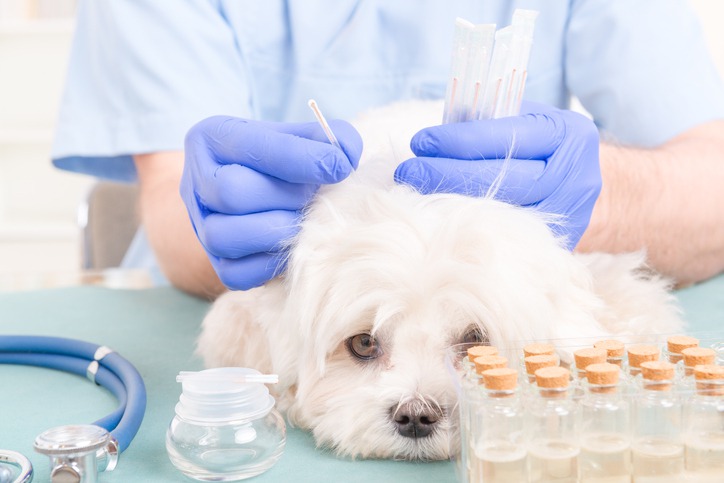As pet owners look for holistic ways to support their pets’ health, veterinary acupuncture has emerged as a popular alternative therapy. But how do you know if it’s the right choice for your furry friend? This article examines when veterinary acupuncture might be suitable for your pet, explores its benefits, and discusses how to find a qualified acupuncturist.
Overview of Veterinary Acupuncture
Veterinary acupuncture, grounded in traditional Chinese medicine, involves the insertion of fine needles into specific points on the body to improve energy flow and promote healing. It’s used to treat various conditions, from chronic pain to gastrointestinal issues.
Definition and Basic Principles
Acupuncture has been practiced for thousands of years, initially in human medicine before being adapted for animals. The basic principle revolves around stimulating specific points on the body to influence the flow of ‘Qi’ (energy), enhancing physiological processes and promoting natural healing.
How It Works
The process involves placing thin needles at specific body points known as acupuncture points. These points are related to both the nervous system and pathways of energy flow. Stimulation of these points is believed to release natural pain-relieving chemicals and modify inflammatory pathways, contributing to overall health improvement.
Benefits of Veterinary Acupuncture
Veterinary acupuncture can offer numerous benefits, particularly for pets suffering from chronic conditions or pain. Here are some of the key benefits:
Common Conditions It Helps With
-
Arthritis: Acupuncture can alleviate joint pain and improve mobility, making it a viable option for older pets with arthritis.
-
Neurological Disorders: Conditions such as intervertebral disc disease can benefit from acupuncture, which helps relieve pain and promote recovery.
-
Gastrointestinal Issues: Pets suffering from nausea, vomiting, or even chronic conditions like inflammatory bowel disease may experience relief.
-
Respiratory Problems: Acupuncture can help manage symptoms related to asthma or other respiratory issues.
Improving Quality of Life
The non-invasive nature of acupuncture makes it an attractive option for improving the overall quality of life for pets, especially those for whom conventional treatments have been ineffective. Many pet owners observe increased energy levels, better appetite, and more comfort in their pets post-treatment.
Is It Right for Your Pet?
Determining if acupuncture is suitable for your pet involves several factors, including their overall health, the nature of their condition, and how well they respond to previous treatments. Here are a few considerations:
Signs and Conditions That Acupuncture May Be Effective
Acupuncture is especially beneficial for chronic disorders and conditions that involve pain and inflammation. If your pet shows signs such as:
-
Chronic pain or arthritis
-
Reduced mobility or stiffness
-
Gastrointestinal disturbances
-
Recurring respiratory issues
Then acupuncture might be a beneficial treatment option. It’s essential to note that while acupuncture can provide symptomatic relief, it may not be a cure for underlying diseases.
Consulting With Your Veterinarian
Before starting any alternative therapy, including acupuncture, it’s crucial to consult with your veterinarian to ensure it’s a safe and appropriate option for your pet. Your vet can provide a comprehensive assessment and may even recommend a qualified veterinary acupuncturist.
While considering acupuncture, it’s also crucial to keep up with routine pet vaccinations & parasite prevention to ensure overall health. These preventive measures are foundational to maintaining your pet’s wellness and should be continued alongside any alternative therapies.
How to Find a Certified Veterinary Acupuncturist
Finding a properly qualified veterinary acupuncturist is essential to ensure the safety and effectiveness of the treatment. Here are some steps to guide you:
Credentials to Look For
When looking for a veterinary acupuncturist, consider the following credentials:
-
Certification: Look for certifications from reputable organizations such as the International Veterinary Acupuncture Society (IVAS) or the American Academy of Veterinary Acupuncture (AAVA).
-
Experience: An experienced practitioner is likely to have a deeper understanding of various conditions and the nuances of acupuncture treatment.
-
Referrals: Ask your primary veterinarian for recommendations or check online reviews from other pet owners.
Questions to Ask
It’s also good practice to interview potential acupuncturists to gauge their expertise. Consider asking the following questions:
-
What is your experience with treating animals of my pet’s breed and condition?
-
Where did you receive your acupuncture training and certification?
-
Can you provide any testimonials or success stories from previous treatments?
Additionally, pet owners in need of professional dental care should visit this link to find qualified specialists. Ensuring all aspects of your pet’s health are managed by professionals can lead to more comprehensive care.
What to Expect During a Session
Knowing what to expect during a veterinary acupuncture session can help ease any anxiety you might have regarding your pet’s treatment. Here’s a detailed look at what typically happens:
Typical Session Structure
Most acupuncture sessions last between 30 to 60 minutes. Here’s what you can generally expect:
-
Initial Consultation: The first session usually involves a thorough consultation where the practitioner reviews your pet’s medical history, current symptoms, and overall health.
-
Needle Placement: The acupuncturist will then insert fine needles into specific points on your pet’s body. This process is generally painless, and many pets tolerate it well.
-
Observation: Needles are typically left in place for about 15 to 30 minutes. During this time, the practitioner may observe your pet’s reactions and make adjustments as needed.
-
Follow-Up: Subsequent sessions are often shorter and focus on tracking and enhancing treatment progress.
Post-Session Care
After the session, it’s important to monitor your pet for signs of improvement or any adverse reactions. Common positive signs include:
-
Increased activity levels
-
Improved appetite and digestion
-
Greater ease of movement
If you observe any adverse effects, consult your veterinarian immediately. It’s also beneficial to keep a journal documenting your pet’s symptoms and progress after each session.
To explore certified veterinary acupuncture services, visit https://www.svanimal.com/site/veterinary-specialties-ketchum/acupuncture for more information. Finding a local and reputable specialist can significantly improve the effectiveness of treatment.
Final Thoughts
Veterinary acupuncture can be a beneficial addition to your pet’s healthcare plan, especially for managing chronic pain and other persistent conditions. By understanding what acupuncture entails, its benefits, and how to find a certified practitioner, you can make an informed decision about whether it’s the right choice for your pet. Always consult with your veterinarian to ensure the treatment is tailored to your pet’s unique needs.





